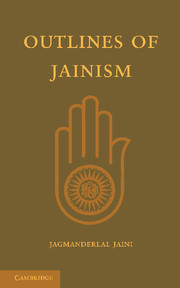CHAPTER III - ETHICS
from OUTLINES
Published online by Cambridge University Press: 05 June 2016
Summary
The aim of Jaina ethics is so to organize the combined activity of a society that its individuals may have the greatest possible number of facilities for attaining moksha or nirvana, i.e. perfect peace and bliss of the soul. Thus, obviously, the rules of conduct, both for laymen and ascetics, must directly or indirectly be conducive to this central aim. Naturally the rules for ascetics are stricter than those for laymen, and provide, as it were, a shorter, albeit harder, route to nirvana, which is the goal for the layman also, but one which he reaches by a longer and slower process.
Here we do not propose to go into the rules of conduct for ascetics. Those who are interested in the subject will find the details in the Achdrdnga-sutra, which is translated by Dr. H. Jacobi in vol. xxii of the Sacred Books of the East (pt. i, pp. 202-210), and in Bhagavati-Arddhand by the monk Sivakoti, an ex-Maharaja of Benares.
The rigour of the ascetic life may be estimated to a certain extent by considering the more or less severe conditions which the Jaina householder must adopt, if he rightly follows the Jaina principles. The best way of exhibiting the rules of conduct for the Jaina layman is to make clear the eleven stages in his life, i.e. the eleven pratimds. They are given below.
But before a Jaina can go on to the pratimds, he must pass through two preliminary stages—
1. He must have faith in Jainism. He must study the doctrine and believe in it thoroughly and sincerely.
2. Then he must become what is called a pdkshika Tirdvaka, a layman intent on following the path of salvation. His duties, as laid down in the Sagara- Dharmamritahy Pandit Asadhara about Samvat 1292 = 1235 A.D., are—
To have faith in Jainism;
To abstain from intoxicants;
To abstain from flesh food;
To abstain from fruits which contain, or are likely to contain, insect; also from honey;
To abstain from taking four kinds of food at night. The four kinds are: eatable, tastable, lickable, drinkable. Eatables, at least, lie must give up at night;
- Type
- Chapter
- Information
- Outlines of Jainism , pp. 67 - 73Publisher: Cambridge University PressPrint publication year: 2013



